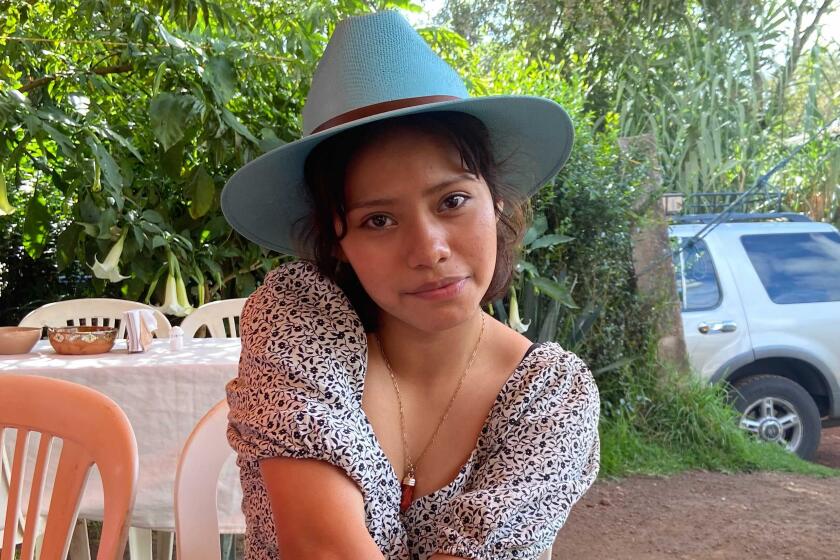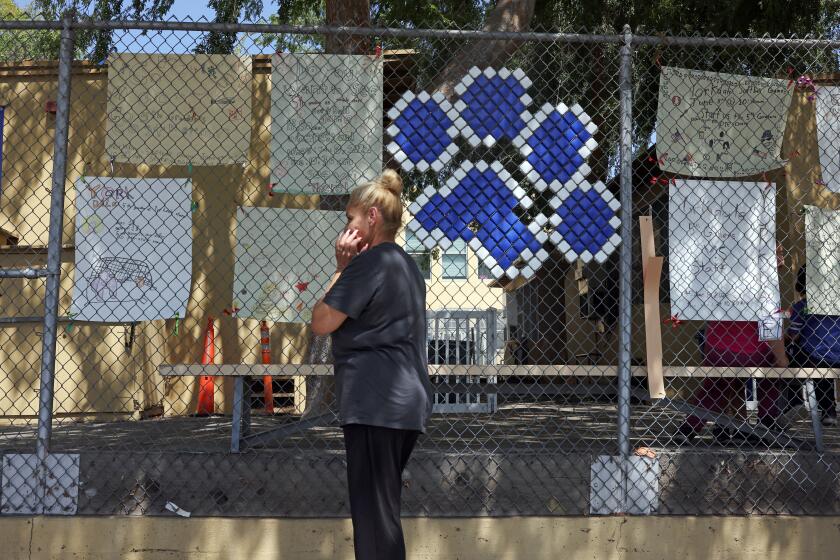Parents want more school security, but student activists push back. Inside the debate
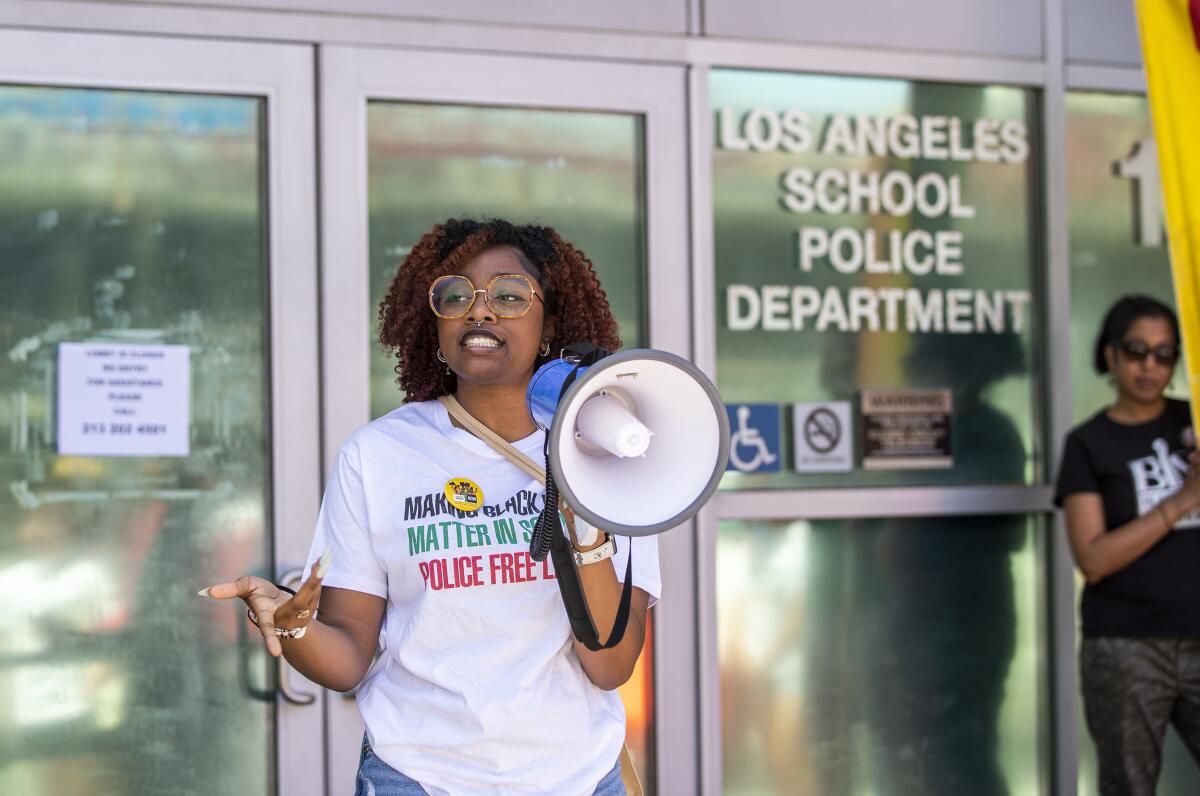
- Share via
As a parent in South Los Angeles, Prentis Hill has no doubt where he stands in the debate over school police and whether to eliminate them. He wants more security in schools — citing an incident of a student allegedly bringing a gun onto his son’s middle school campus last year.
Maria Agueda, the parent of a student at the Bernstein High School campus in Hollywood, would go even further. In the wake of a 15-year-old student’s overdose death in September, she said she supports police bringing in canines and conducting random drug searches.
Their demands, however, run counter to those of high school activists and labor, legal and community organizations pushing to eliminate school police and redirect those resources to drug awareness, student mental-health support and Black student achievement programs — a goal that they fear is being overtaken by concerns over crime. They saw partial success in 2020 when the Board of Education cut the school police budget by a third and took away the police officer stationed at every high school.
Though there’s broad agreement among parents and students on the need for strong mental-health services — and school district officials say they are responding to this imperative — impassioned opinions on the role of law enforcement in school safety have surged to the forefront as Supt. Alberto Carvalho is preparing to bring forward a school safety plan.
Students Deserve, United Teachers Los Angeles, the ACLU of Southern California, the Los Angeles Alliance for a New Economy, the Collective for Liberatory Lawyering and Reclaim Our Schools L.A. sent a letter last month to Caravalho and the school board opposing calls to increase policing. The groups had been alarmed by statements from Carvalho and L.A. Police Chief Michel Moore who said after the Bernstein High death that school police play a valuable role on campus. In their letter, the groups said campus police create a climate of fear and foment distrust between students and the adults who educate and nurture them.
L.A. schools Supt. Carvalho and Police Chief Moore reach for strategies to prevent more overdose deaths on and off school grounds.
“People feel uneasy and scared around police,” Jaylene Mora Torres, an 11th-grader who attends a school located on the Bernstein campus, said in the coalition’s letter. “We shouldn’t have more of a police presence because kids [will get] racially profiled or profiled on stereotypes. And we shouldn’t bring back the random searches,” she added, referring to a decades-old practice that ended in 2019.
The protests around the 2020 police killing of George Floyd had energized calls to “defund the police.” Scattered districts around the country began doing so, including those in Seattle, Portland and Oakland as well as Los Angeles.
But the mass school shooting in Uvalde Texas, last spring, other violent incidents and the recent Los Angeles student overdoses and campus death have swung the pendulum, driving demands for more school security and reigniting debates over what that should look like.
Parents are demanding answers on safety after Texas school shooting. Here’s what California is doing.
All along, officials in deeply conservative states have favored safety measures that don’t infringe on gun owners’ rights. Their actions have trended toward getting more weaponry into schools, through a “good guys with guns” approach that would add police officers as well as train and arm teachers.
Lawmakers in California — which already has the strongest gun measuresin the nation — passed a new law after Uvalde requiring schools to remind parents annually about their legal obligation to store guns securely, and required school systems to report threats and perceived threats to law enforcement.
Some school districts in California that had stepped back from relying on police, including Fresno Unified, Fremont Unified and Pomona Unified, restored or even increased law enforcement — while also trying to enhance approaches that focus on civil rights, mental health and alternatives to suspensions and arrests.
The Fresno Unified Board of Education, which had kept city police officers at high schools but eliminated them in middle schools, changed course in June, returning officers to middle schools. And now they’ll be on campus full time instead of part time. The district also agreed to collect and release data on interactions between students and police to address civil rights concerns.
Districts throughout the state, including Los Angeles Unified and Montebello Unified, have recently tightened security — adding surveillance cameras and more fencing, limiting campus entrance points and improving emergency communication.
Parents are demanding answers on safety after Texas school shooting. Here’s what California is doing.
Carvalho has pointed to a fall 2020 district survey as evidence that students, parents and district staff believe that campus police make schools safer. The survey included responses from 35,467 10th- through 12th-grade students, 6,639 high school parents and 2,348 high school staff.
About 53% of students said they feel safer when a school police officer is on campus compared with 13% who said they did not. And 52% said they believe police treat students with respect compared with 9% who did not believe that. Throughout the survey, large numbers expressed no opinion or said they did not know.
As a group, Black students were less supportive but not strongly anti-police in response to such questions as: Do you feel that having school police on your campus makes your school safe? Thirty-five percent said yes; 20% said no; 45% did not know or did not mark an answer.
Support for school police was higher among school staff and higher still among parents.
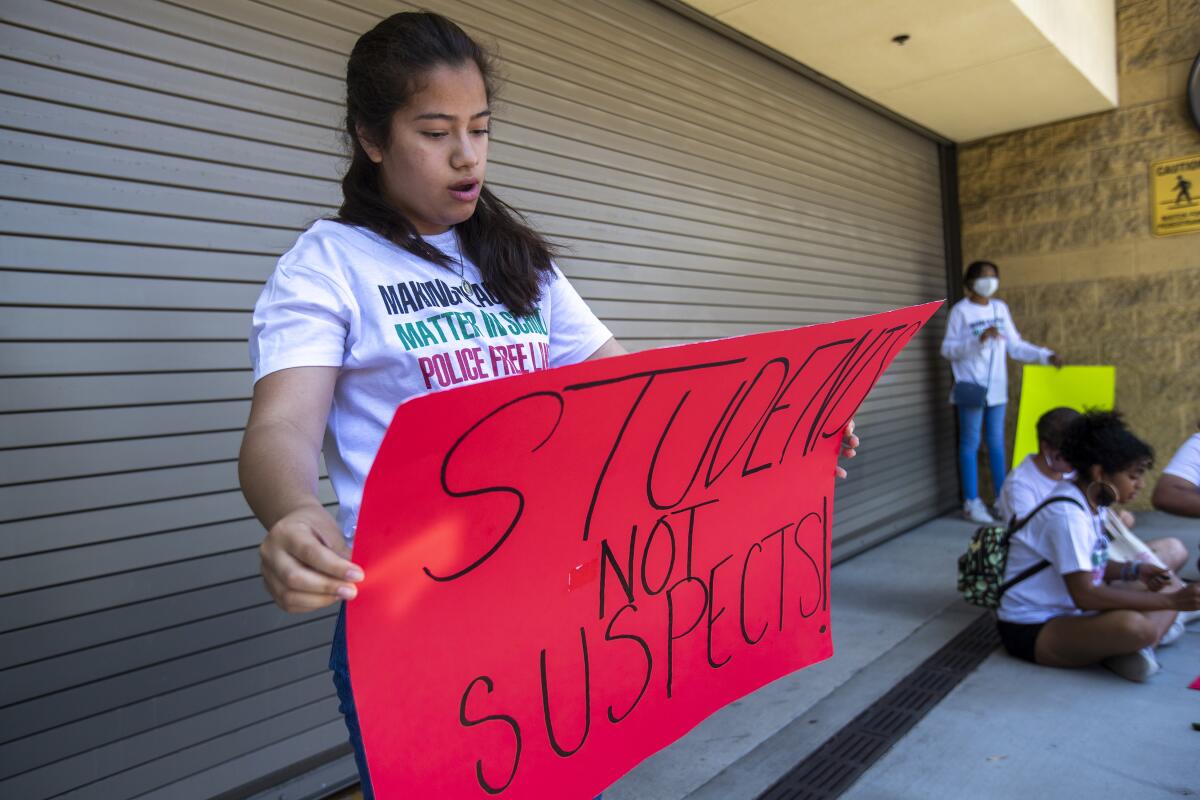
“Our public safety strategy going forward is currently — and will be even more so — informed by all voices rather than targeted or selected voices,” Carvalho said. “I think that’s fair. We serve the entire school system, right?”
The school board had decided in June 2020, by a 5-2 vote, to begin eliminating school police, starting with the 35% budget cut. The vote came amid national protests over Floyd’s murder and was supported by the senior leadership of UTLA, in alliance with leaders of the local Black Lives Matter chapter.
That board action came after sustained protests from student activists — especially Black students — and their supporters who have long insisted that police officers should have no connection to schools. They remain unwavering in their stance and say, for example, that police should also be removed from school-related events, including football games between rival schools, where officers from multiple agencies currently take part in supervision.
They assert that there are more than enough city-funded police to monitor social media for risk and respond to school theft and vandalism, terrorist threats and dangerous campus disturbances. L.A.’s young activists and their supporters say police make campuses more dangerous for students of color.
“Students of color feel that they are immediately being looked at as targets and being criminalized,” said Simya Smith, a senior at Dorsey High in South Los Angeles. “I think it makes situations worse.”
“The communities that we live in are already heavily policed, and that in itself does not stop crime,” Simya said.
Research on the effects of campus police suggests that improperly run school police departments disproportionally affect Black and Latino youths.
Some academics assert that any school police department — regardless of how it’s run — can have negative effects. Others conclude that the presence of police leads to a reduction in violence but can be a trade-off accompanied by worse outcomes in other areas, such as avoidable suspensions, citations and arrests — ultimately contributing to higher dropout rates.
“There is a safety tax that all students pay in those schools,” said Odis Johnson, a professor of education and health policy at Johns Hopkins University who studies policing in schools.
Parent LaTanya Jackson said an officer makes a campus less safe as well as less welcoming, particularly for Black students.
“It always turns against us,” said Jackson, whose son attends a high school in East L.A. “We wind up being the ones to get hurt. We wind up being the ones who get put in handcuffs.”
She recalled the day her son wanted to leave school after seeing police become aggressive with another student: “He was like: ‘Mom, I don’t want to be here. I don’t feel safe.’”
Ultimately, she said, her son remained at the school — and overcame being bullied by another student — through interventions that did not involve an officer.
Recent Dorsey High graduate Khedija Shafi said she noticed a positive difference last year when staff involved in the Black Student Achievement Plan (BSAP) replaced a police officer near the school entrance. Students seemed “more excited and engaged because we’re always welcomed by the BSAP team at the door,” she said, “whereas before we were welcomed by police, standing there, making us feel like criminals.”
Students and groups in the Police Free LAUSD Coalition see those who don’t side with them — including other students — as underinformed or misinformed. Last spring they launched what they described as a “massive” distribution of campaign-style buttons calling for defunding school police.
Parents in support of school police and other security measures don’t see an either/or question. They acknowledge that preventive mental health support is probably the most vital safety approach.
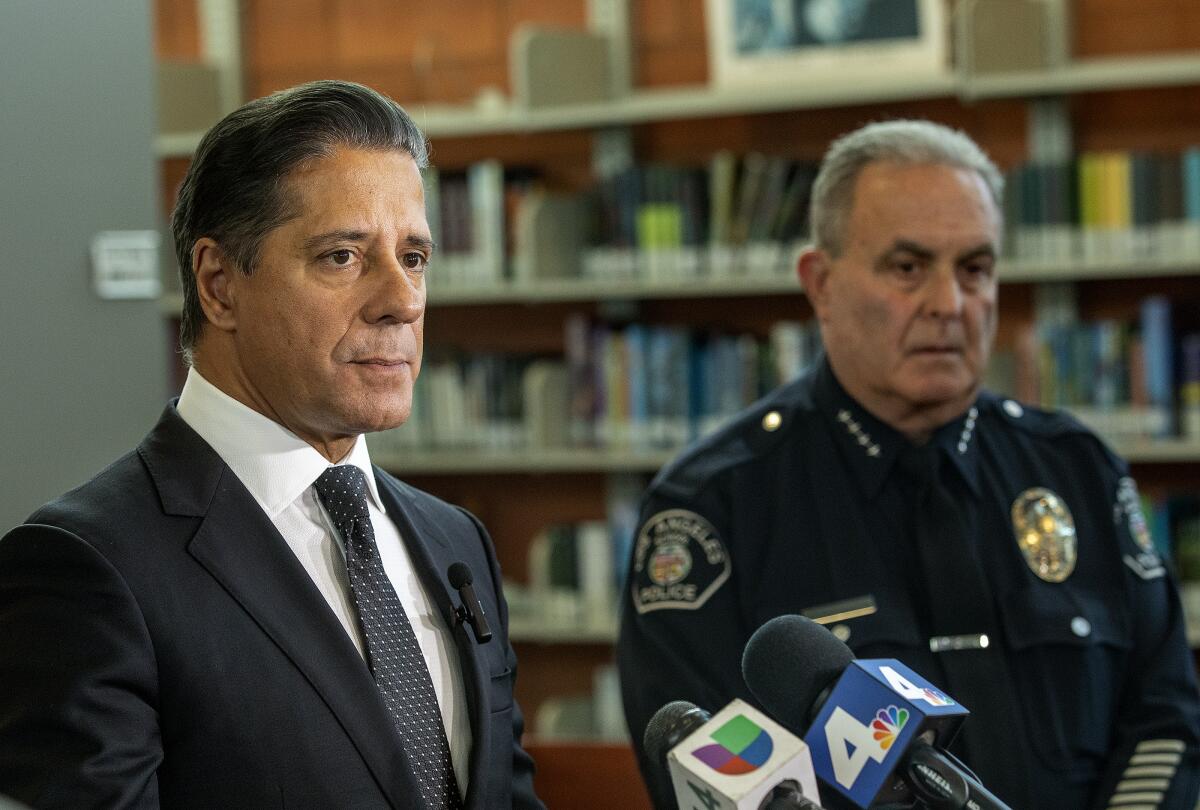
Hill, the parent of a child at Harte Middle School, said he’s not naïve about the potential for police abuses. As a Black man, he said, he’s been pulled over or hassled for no reason. But police have a key role in keeping students safe, he said, even if it makes some students uncomfortable.
Last year, he said, his son confided that a student, possibly from another school, had gotten onto campus and was waving around a 9-millimeter gun in front of other students. Hill said he reported the incident to an administrator but was bothered that there was no officer to respond, or to deter such behavior.
Parents such as Hill believe it’s important for an officer to provide that last line of defense against bullying, drug sales, neighborhood violence and the admittedly rare school shooter.
Carvalho directly addressed Hill’s concerns during a recent meeting with parents at his son’s school in the Vermont Vista neighborhood of South L.A.
“Thing No. 1,” he told Hill, “the police budget this year was maintained. That’s important. Secondly, we are hiring officers as we speak. Third, we have a new police chief. ... So the steps that were taken in the past,” he said, referring to the defunding goal, “they’ve been stopped.”
For now the district is touting what it describes as a comprehensive approach to safety. In recent years, the district has added 1,500 security cameras. Students and parents can report safety concerns through an app. A different app for staff, about to be put in use, incorporates automatic geolocation features. And a new school bus route was added this year in South L.A., to help middle school students bypass potential gang territory.
L.A. school police Chief Steven Zipperman said school police have evolved — especially in L.A. — to support the mission of education. Officers — in plainclothes, not uniforms — have become part of counseling teams that provide support to students who have expressed thoughts of violence or suicide. Zipperman said the department also has embraced practices to limit arrests and to keep students in school and out of the criminal justice system. The department, he said, has directly taken to heart concerns raised by Students Deserve and other groups.
But keeping police off campuses — except in a crisis — also has curtailed opportunities for positive and mentoring relationships with students, Zipperman said.
“What’s lost is the actual day-to-day, in-depth understanding of what is happening on the campus and ... the connections with students to mitigate and stop some of the issues,” he said. “That is not the same as when officers were on campus.”
More to Read
Sign up for Essential California
The most important California stories and recommendations in your inbox every morning.
You may occasionally receive promotional content from the Los Angeles Times.
